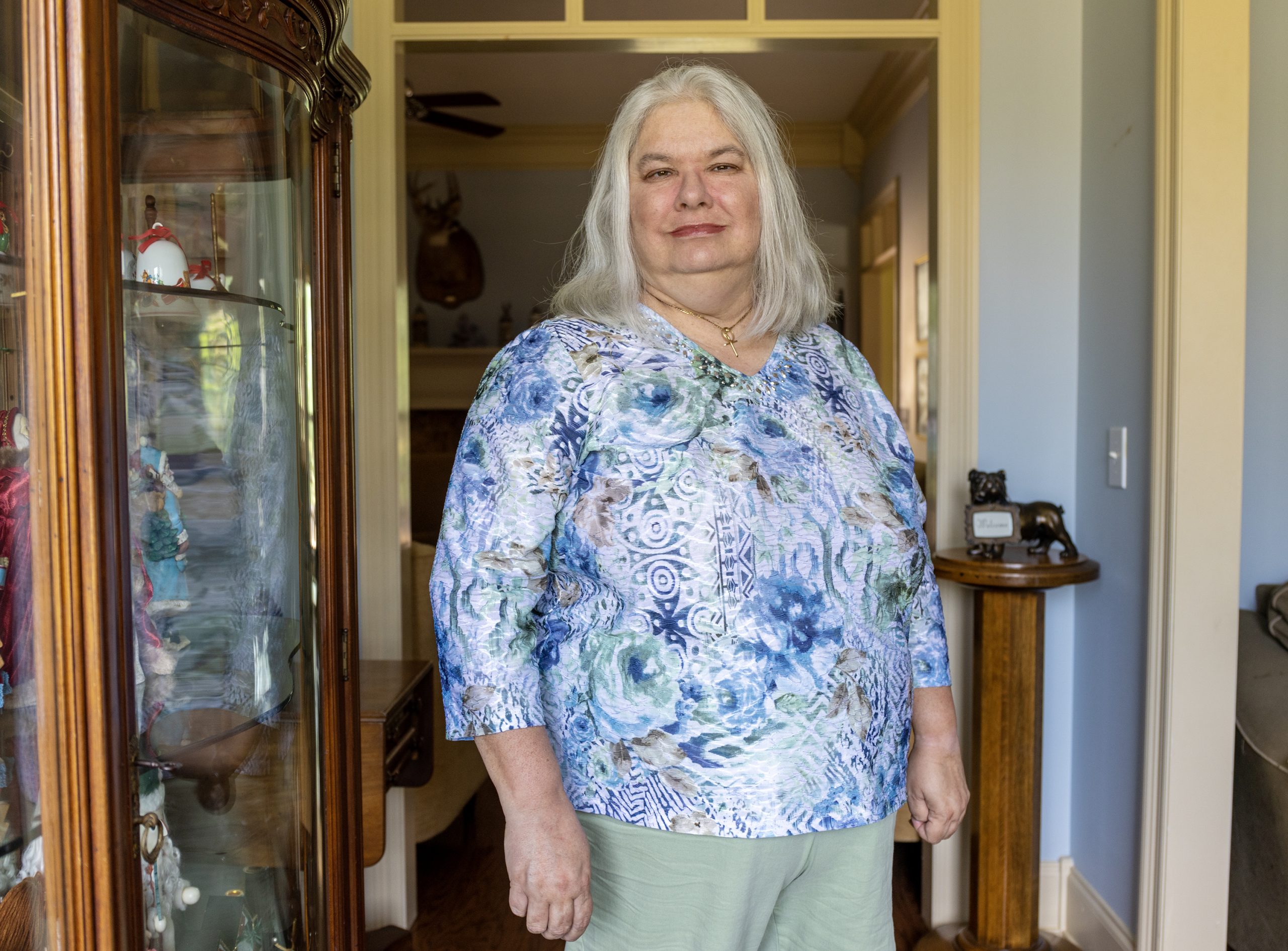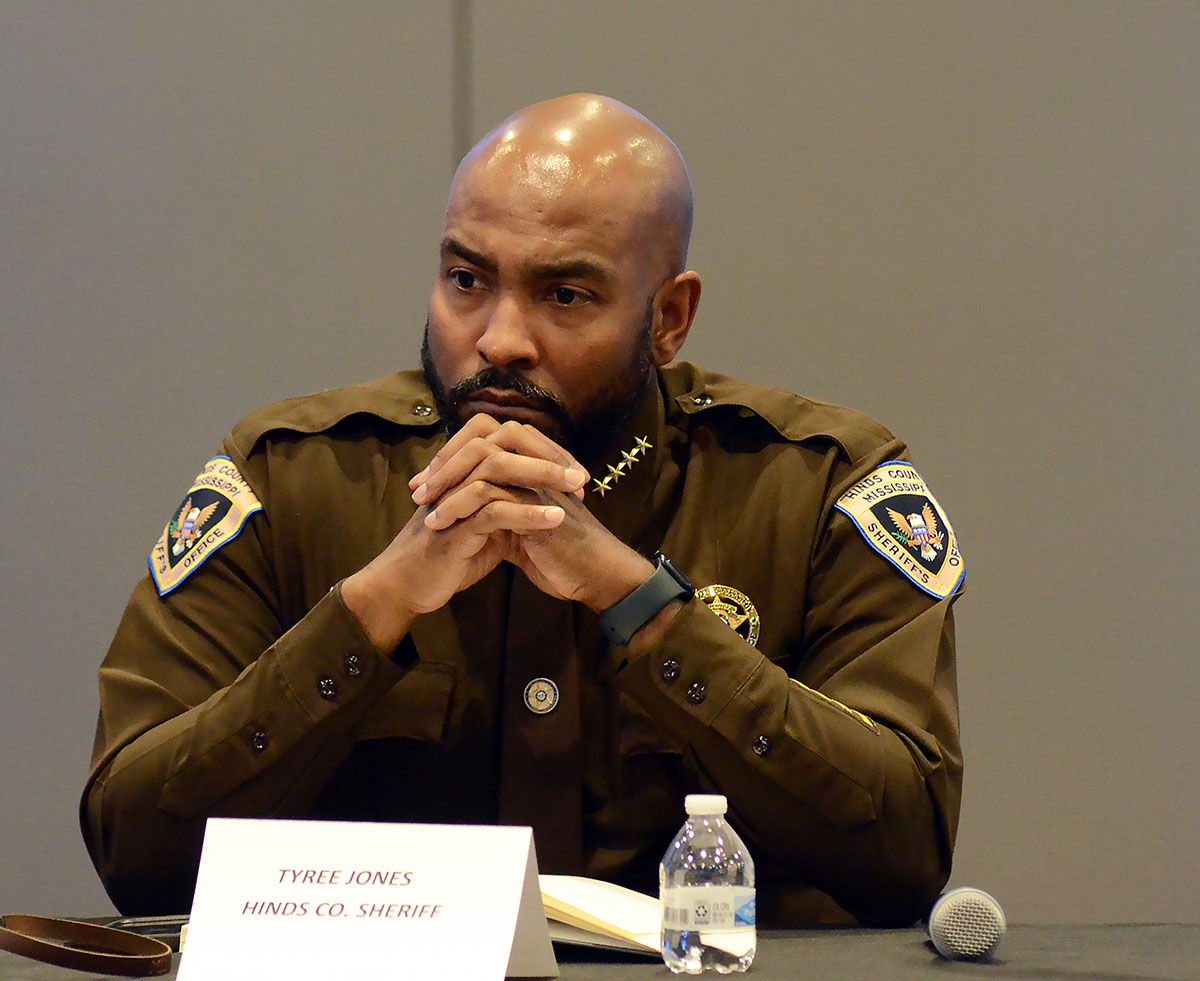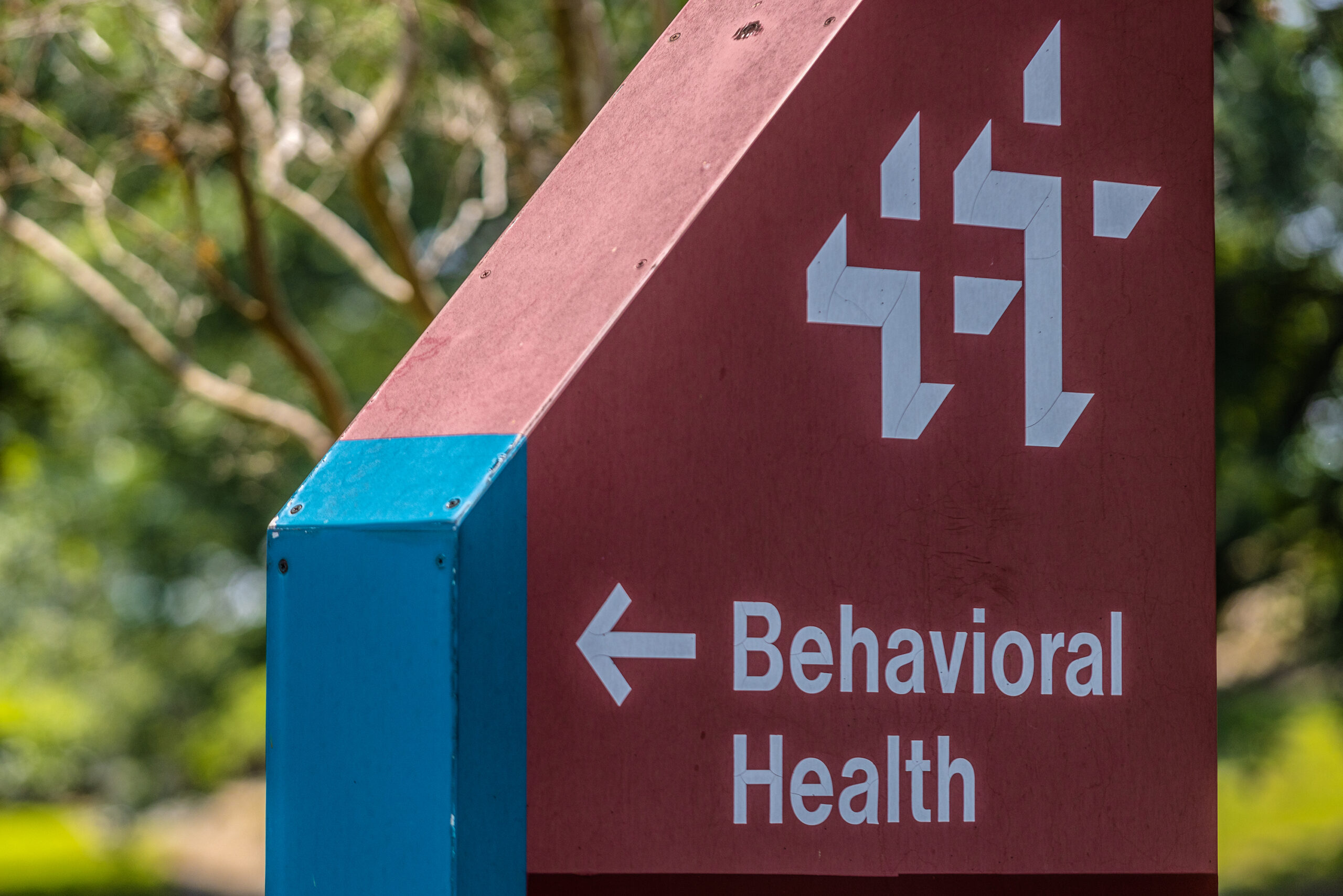Mississippi Today
Patients, advocates worry more people will end up in jail or without treatment following St. Dominic behavioral health closure

Julie Whitehead of Brandon is a longtime patient of St. Dominic's behavioral health services. After being admitted to the hospital following a suicide attempt in 2006, Whitehead was diagnosed with bipolar disorder.
She was admitted again six times over the next 15 years.
“Each one of those times, if I had not been admitted to St. D, I would be dead,” Whitehead said.
So when she heard the news the 83-bed unit was closing last week, she took it hard.
She has always considered herself lucky – she works part time and has Medicare and private insurance through her husband.
“I have resources. I'm not in the fix that a lot of people are in who suffer from mental illness. I'm not dependent on Medicaid and trying to find doctors who will take Medicaid, so I'm never worried about getting care,” she said.
But when St. Dominic's announced the closure, her perspective changed.
“I've just kind of been in shock because if the beds aren't there, it doesn't matter whether I can pay for it or not …” she said.
The unit had been providing inpatient mental health and geriatric psychiatric treatment. But the nonprofit hospital, citing “significant financial challenges” and losses of several million dollars, announced it was discontinuing the services and laying off 5.5% of its total workforce earlier this month.
The hospital's most recent available tax filing for the fiscal year ending June 2021 showed a loss of $21.7 million for the prior year. That year's tax filing showed a gain but coincided with hospitals receiving an influx of federal COVID-19 aid.

Advocates and law enforcement worry that as a result of the closure, more people in the Jackson area who need treatment will end up in jails or without the help they need.
Hinds County Sheriff Tyree Jones called the move “disappointing” in a tweet.
“Jails across our state and America are populated with ‘patients' suffering from mental illnesses. Sheriffs and wardens assume the responsibility of these individuals when in reality, SOME of them should not be in jail but rather a treatment institution,” he wrote. “The risks will increase.”
A spokesperson for St. Dominic said the hospital recognizes mental health is “a significant need.”
“While continuing to meet these needs directly is no longer viable for St. Dominic's, we are working with partners to help patients access the care they need,” Meredith Bailess said in an emailed statement. “Our health system will continue to advocate for additional state and federal resources to stabilize healthcare providers in Mississippi.”
Although the Mississippi State Hospital opened 20 adult psychiatric beds earlier this year that had been closed due to staffing issues, reliance on the state-funded hospital is no longer a viable option as jailed suspects wait weeks and even months for an available bed for a mental health evaluation. Bed availability at the University of Mississippi Medical Center in Jackson is limited, with only 21 adult beds and 12 beds for children.
Hinds Behavioral Health Services is one of 14 regional community mental health centers in Mississippi. The goal of the centers is to provide services to citizens with mental health issues and, when possible, keep people out of institutions.
The center runs a 24/7 mobile crisis unit that responds to people in crisis and attempts to stabilize them.
However, of the 1,196 people the unit came in contact with over the last year, 643 of those required a higher level of care, or admission to an inpatient facility, according to Jamie Evans, the supervisor for the mobile crisis unit at Hinds Behavioral Health Services.
When that happens, there are two options in the metro area for those people to go and immediately receive care: St. Dominic and Merit Health Central. The other options, which are referred to as a “single point-of-entry,” is the 16-bed crisis stabilization unit in Jackson. Another is the unit in Brookhaven, about an hour drive from Jackson.
Crisis stabilization units are short-term residential treatment facilities run by community health centers where people having a mental health crisis can be stabilized.
Single point-of-entry locations have memorandums of understanding with the community health center, and patients are able to bypass emergency rooms and be immediately admitted for care.
“It's almost as if even if they are full, they secure beds on the side for us, because we're meeting an individual in crisis, in one of the most vulnerable points in their mental health,” said Evans, explaining the relationship between Hinds Behavioral Health Services and single points of entry. “It's very fast paced, and we really don't have time to sit in the ER and wait for a doctor to see them.”
Now, however, the only single point-of-entry option besides the crisis stabilization unit in Jackson is Merit Health Central, which houses around 70 psychiatric beds, according to Evans.

The services' closure, which Hinds Behavioral Health Services learned about at the same time the hospital made its public announcement, will leave a substantial gap, Evans and other mental health advocates agreed.
“There will be a huge impact to the systems, especially the elderly and those that find themselves in a crisis situation,” said Angela Ladner, executive director of the Mississippi Psychiatric Association.
She also said the speed at which the closure is happening is “disconcerting.”
In worse-case scenarios, mentally ill people with nowhere to go can end up in jail – unregulated facilities that are detrimental to people going through a mental health crisis.
In an attempt to minimize that practice, the Legislature this year passed House Bill 1222, which required mental health training for law enforcement agencies.
The hospital, which was purchased by the Baton Rouge-based Franciscan Missionaries of Our Lady Health System in 2019, announced the unit was closing on June 5 and would stop accepting patients at 7 a.m. the next day.
In the meantime, Evans and other advocates say they will work together to find a way to bridge the gap. Hinds Behavioral Health Services received funding to open a second, 16-bed crisis stabilization unit in Hinds County, but that won't happen immediately.
Whitehead says her next steps are to collect a “portable” version of her more-than-a-decade worth of medical records to take with her wherever she lands next.
She guesses the only other thing she can do is “do my best to stay stable.”
Correction 6/14/23: This story has been updated to reflect that there is also a crisis stabilization unit in Jackson.
Editor's note: Julie Whitehead freelanced for the Mississippi Center for Investigative Reporting, which is now part of Mississippi Today.
This article first appeared on Mississippi Today and is republished here under a Creative Commons license.
Mississippi Today
On this day in 1968
MAY 11, 1968

The Poor People's Campaign arrived in Washington, D.C. A town called “Resurrection City” was erected as a tribute to the slain Martin Luther King Jr.
King had conceived the campaign, which was led by his successor at the head of the Southern Christian Leadership Conference, Ralph David Abernathy. Civil rights leader Jesse Jackson reached out to young Black men wanting vengeance for King's assassination.
“Jackson sat them down and said, ‘This is just not the way, brothers. It's just not the way,”' recalled Lenneal Henderson, then a student at the University of California at Berkeley. “He went further and said, ‘Look, you've got to pledge to me and to yourself that when you go back to wherever you live, before the year is out, you're going to do two things to make a difference in your neighborhood.' It was an impressive moment of leadership.”
This article first appeared on Mississippi Today and is republished here under a Creative Commons license.
Mississippi Today
Lawmakers may have to return to Capitol May 14 to override Gov. Tate Reeves’ potential vetoes
Legislators might not have much notice on whether they will be called back to the Mississippi Capitol for one final day of the 2024 session.
Speaker Jason White, who presides over the House, and Lt. Gov. Delbert Hosemann, who presides over the Senate, must decide in the coming days whether to reconvene the Legislature for one final day in the 2024 session on Tuesday at 1 p.m.
Lawmakers left Jackson on May 4. But under the joint resolution passed during the final days of the session, legislators gave themselves the option to return on May 14 unless Hosemann and White “jointly determine that it is not necessary to reconvene.”
The reason for the possible return on Tuesday presumably is to give the Legislature the opportunity to take up and try to override any veto by Gov. Tate Reeves. The only problem is the final bills passed by the Legislature — more than 30 — are not due action by Reeves until Monday, May 13. And technically the governor has until midnight Monday to veto or sign the bills into law or allow them to become law without his signature.
Spokespeople for both Hosemann and White say the governor has committed to taking action on that final batch of bills by Monday at 5 p.m.
“The governor's office has assured us that we will receive final word on all bills by Monday at 5 p.m.,” a spokesperson for Hosemann said. “In the meantime, we are reminding senators of the possibility of return on Tuesday.”
A spokesperson for White said, “Both the House and Senate expect to have all bills returned from the governor before 5 p.m. on Monday. The lieutenant governor and speaker will then decide if there is a reason to come back on May 14.”
The governor has five days to act on bills after he receives them while legislators are in session, which technically they still are. The final batch of bills were ready for the governor's office one day before they were picked up by Reeves staff. If they had been picked up that day earlier, Reeves would have had to act on them by Saturday.
At times, the governor has avoided picking up the bills. For instance, reporters witnessed the legislative staff attempt to deliver a batch of bills to the governor's Capitol office one day last week, but Reeves' staff refused to accept the bills. They were picked up one day later by the governor's staff, though.
Among the bills due Monday is the massive bill that funds various projects throughout the state, such as tourism projects and infrastructure projects. In total, there are more than 325 such projects totaling more than $225 million in the bill.
In the past, the governor has vetoed some of those projects.
The governor already has taken action of multiple bills passed during the final days of the session.
He allowed a bill to strip some of the power of the Public Employees Retirement System Board to become law without his signature. The bill also committed to providing a 2-and-one-half percent increase in the amount governmental entities contribute to the public employee pension plan over a five year period.
A bill expanding the area within the Capitol Complex Improvement District, located in the city of Jackson, also became law without his signature. The CCID receives additional funding from the state for infrastructure projects. A state Capitol Police Force has primary law enforcement jurisdiction in the area.
The governor signed into law earlier this week legislation replacing the long-standing Mississippi Adequate Education Program, which has been the mechanism to send state funds to local schools for their basis operation.
This article first appeared on Mississippi Today and is republished here under a Creative Commons license.
Mississippi Today
On this day in 2007


MAY 10, 2007

An Alabama grand jury indicted former state trooper James Bonard Fowler for the Feb. 18, 1965, killing of Jimmie Lee Jackson, who was trying to protect his mother from being beaten at Mack's Café.
At Jackson's funeral, Martin Luther King Jr. called him “a martyred hero of a holy crusade for freedom and human dignity.” As a society, he said, “we must be concerned not merely about who murdered him, but about the system, the way of life, the philosophy which produced the murderer.”
Authorities reopened the case after journalist John Fleming of the Anniston Star published an interview with Fowler in which he admitted, despite his claim of self-defense, that he had shot Jackson multiple times. And Fleming uncovered Fowler's killing of another Black man, Nathan Johnson. In 2010, Fowler pleaded guilty to second-degree manslaughter and was sentenced to six months behind bars.
This article first appeared on Mississippi Today and is republished here under a Creative Commons license.
-
SuperTalk FM5 days ago
Legislation outlawing ‘squatted’ vehicles in Mississippi signed into law
-
SuperTalk FM4 days ago
Mississippi governor approves bill allowing electronic search warrants
-
228Sports5 days ago
PRC’s Bats Come Alive Late As Blue Devils Beat Picayune To Advance To 6A South State Title Series
-
Mississippi News7 days ago
LCSO wants people aware of a scam circling the area
-
Mississippi News7 days ago
Winston Co. Sheriff’s Office investigates shooting at Dave’s Club
-
Mississippi News4 days ago
Strong storms late Wednesday night – Home – WCBI TV
-
SuperTalk FM4 days ago
$30 million RV park coming to Natchez features amphitheater, pickle ball courts, and more
-
Mississippi News3 days ago
Louisville names street after a former high school








































